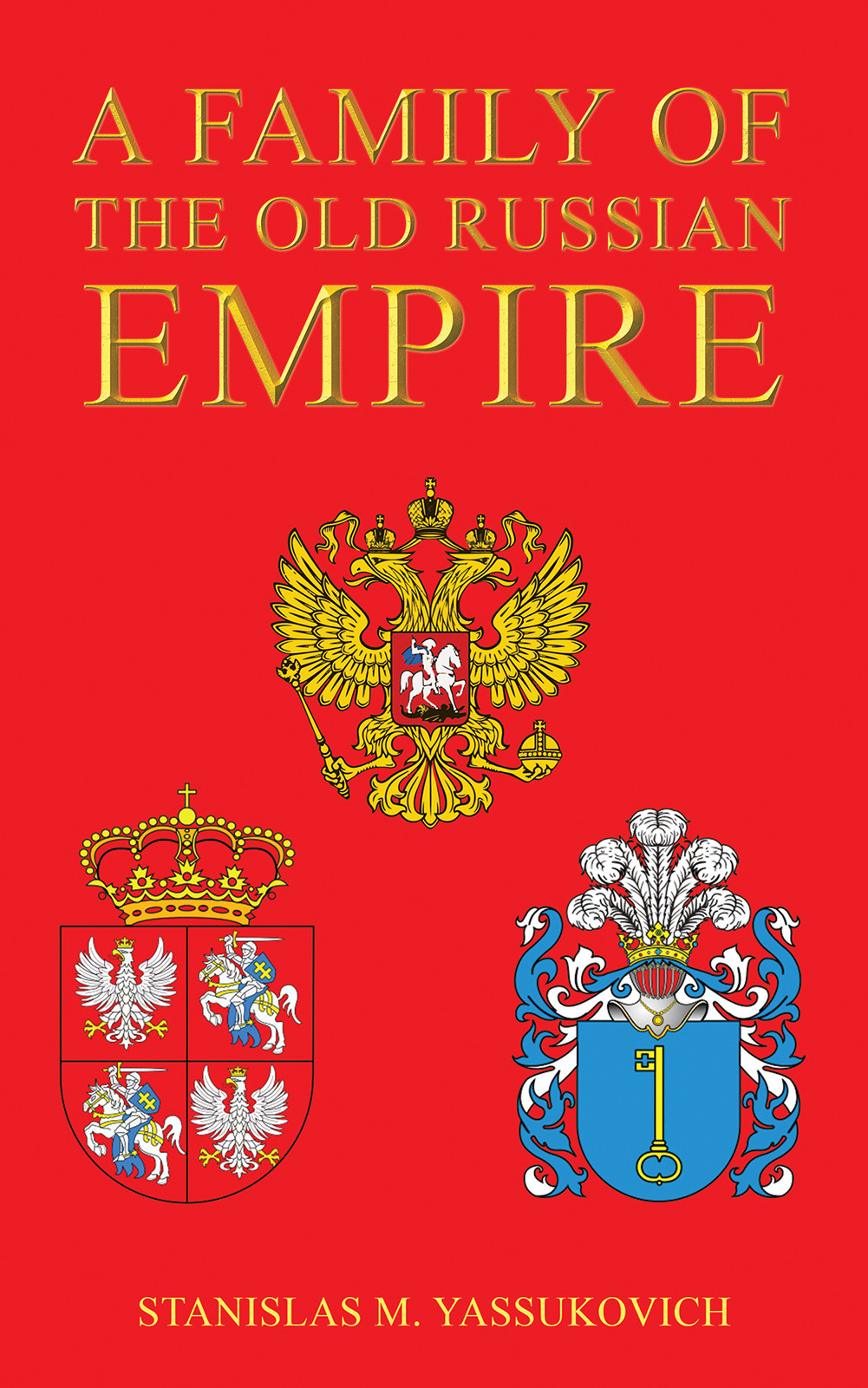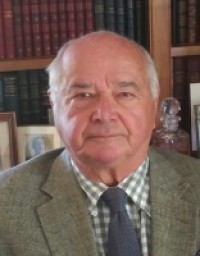
A Family of the Old Russian Empire
Book Format: Choose an option
Free standard delivery on UK orders over £35
*Available directly from our distributors, click the Available On tab below

Book Format: Choose an option
Free standard delivery on UK orders over £35
*Available directly from our distributors, click the Available On tab below

Stanislas Yassukovich was born in Paris of a White Russian émigré father and a French mother. Settling in the United States at the outset of World War II, he was brought up on the North Shore of Long Island, N.Y., attending Green Vale School there, Deerfield Academy in Massachusetts, and Harvard College. After service in the U.S Marine Corps, he joined White, Weld & Co., New York investment bankers and was posted to its London office. Yassukovich subsequently formed and managed European Banking Company, became a Deputy Chairman of The Stock Exchange, London, Chairman of the Securities & Futures Authority, and, finally, Chairman of Merrill Lynch Europe, Middle East & Africa. After service as a non-executive director on various boards, he retired to the South of France. He was made a Commander of the Order of the British Empire, and is a Fellow of the Royal Society of Arts. He is married to the former Diana Townsend, and has three children: Tatyana, Michael and Nicholas.
A Family of the Old Russian Empire, introduces and begins to tackle a critical theme of parallel lives in parallel worlds which defined the 20th century. It is one of the cruelest but most fascinating social experiments that European society has endured in the past 500 years. More importantly, it is a subject that many Russian émigré have been trying to tackle too following the collapse of the USSR. This must be due to an inherent curiosity regarding the extent to which the Soviet system expelled or expunged the characteristics of the pre-1917 Russian identity by attempting to crush the class characteristics of its internal exiles or the "former people." On many occasions, when spending time with my “Soviet" born families, I will recognise familiar elements of traditions and speech that we practice at home and that appear utterly preserved and maintained while at the same time there is a clear reminder that they endured a difficult existence and carry the social scars of a Soviet upbringing. That said, I have stopped calling them Soviet and I have been able to witness the triumph of family traditions over repression and political re-engineering. Yassukovich's book is a fascinating read and a small but important step in rectifying the horrors of the separation of families by a geographic and political divide.
Happy families are all alike; each unhappy family is unhappy in its own way.” The famous opening sentence of Leo Tolstoy’s Anna Karenina acknowledges the universal quality all family shares—but for some families the unhappiness is made even more wretched because of revolution, upheaval and separation. What makes Stanislas M. Yassukovich’s A Family of the Old Russian Empire particularly poignant is that despite revolution, upheaval and separation, families that had once thought to have been obliterated can, like acorns from a mighty oak, come to life once again. Yassukovich’s father, Dmitri, was a White Russian nobleman who miraculously not only survived the Russian Revolution but also, after escaping to America as a young man, went on to enjoy a distinguished career in international finance. As a result, Yassukovich fils enjoyed a privileged upbringing, was educated at private schools and Harvard, and then himself went on to pursue a distinguished banking career as well. Despite this privilege, he was always aware that the revolution had deprived him of not only his ancestral home and status, but also of his relatives. Within his immediate family it was understood that his father had two older sisters, Irina and Marie Magdalena, who had remained in Russia after the revolution. While Marie Magdalena had eventually been able to flee the Soviet Union to Poland—where she endured considerable hardship--his father has always told him that his aunt Irina who “married during, or just after the war, had disappeared with her husband and small daughter and that all were presumed killed.” What’s more, his father maintained that “his efforts to locate them in the 1920s” had been in vain. Except that wasn’t true. Several years ago Yassukovich was contacted by a Ukrainian historian who told him that a woman in St Petersburg claimed to be a cousin of his. It turned out that this woman was his Aunt Irina’s granddaughter and, instead of dying in the aftermath of the revolution, Irina had lived after all. This inspired Yassukovich to look into not only the circumstances surrounding his aunt’s survival but also his father’s determination to keep his family ignorant of the truth. Yassukovich begins his book describing his father Dmitri’s antebellum childhood as being typical of the son of a Russian noble and military family in Tsarist St Petersburg. But the revolution interrupted the natural course that his life would have taken. Fortunately for him, his father, a general in the Imperial Russian Army, had been sent by the Russian government to procure arms from the United States, which is where he was living when the revolution broke out. Dmitri was briefly imprisoned by the Bolsheviks and then served in a lancer unit before being able to make his way to America and his father around 1918. He would never see his sisters again. But he did remain in touch. According to Yassukovich, Dmitri was able to send money to his sister Irina during the 1920s before such transactions were prohibited by the Soviets. What confuses Yassukovich is why if his father knew his sister was alive did he never talk about her and to keep his actions secret from his family? What transpired is that Irina had a child named Galina from her first marriage. She then married a man who was convicted of espionage—a rather loose interpretation based on a sweeping Soviet law designed to imprison supposed enemies of the state—and sentenced to Siberia. As the wife of a prisoner she follows him into exile, is eventually denounced herself, tortured and sent to a gulag. Galina, however, is, barely, able to avoid her mother’s fate and eventually becomes a respected doctor—and the grandmother of the woman from St Petersburg who first alerted Yassukovich to the existence of his previously unknown cousins. Moreover, his cousin possessed a treasure that had belonged to Irina that was irrefutable proof of their connection: a photograph of Yassukovich and his elder sister as very young children in their apartment in Paris in the 1930s. How else would she have the photo if it had not been sent by his father? Throughout the book, Yassukovich contrasts his fortunate upbringing and subsequent successful career and marriage with those of his unknown cousins. Clearly, he latterly feels a sense of guilt that he should have been blessed with so many advantages while his cousins struggled under the Soviet regime. This sense of guilt helps him to understand a little better his father’s determination to wall off digging into his own past. Yassukovich cites numerous occasions when his father encountered old comrades and fellow White Russians, but little is ever shared with his son. Unfortunately, his father developed dementia towards the end of his life so any opportunity that Yassukovich might have had to question him about his childhood and family in his declining years never presented itself. This determination by Dmitri to sequester his past was a mystery that for most of his life Yassukovich had difficulty reconciling but after learning about his aunt’s stories he wonders if father’s reticence was a form of survivor’s guilt. However, in the end, he dismisses this theory. As he writes: “The sufferings of Irina, which she experienced with great fortitude, strength of character and some luck—were all the result of her desire to remain in Russia. And in her closing years—in many conversations with her granddaughters, she was firm in expressing no regret for her decision.” Furthermore, in 1946 Irina was declared “rehabilitated” by the Soviet government and was able to live in relative comfort with her daughter Galina to the end of her days. Nor would Dmitri have felt particular guilt about the fate of his other sister, Marie Magdalena, who lived in comparative peace in Poland until WWII when, following the Warsaw Uprising in 1944, she is believed to have taken her own life. Separated by war and distance, Dmitri would not learn of his sister’s death until later when he took charge of her daughter. What is clear is that his father was a very complex and stoic man, one who because of both his nature and the strictures of his class was not given to navel-gazing. As Yassukovich summarizes: “The conclusion of my search must be that there was a multiplicity of reasons for my father’s silence and his failure to relate to us even the most basic facts of his family history. If we must pick one dominant factor, it is that explaining later an event which caused trauma at the time, repeats the trauma, requires further expansion of the explanation, and therefore encourages silence as a prophylactic.” It may hard for most contemporary readers to empathize with Dmitri’s silence. We live in an age of almost constant introspection and need for affirmation, where every single nuance of life must be examined, re-examined and judged. While Yassukovich has done an impressive amount of work to unearth as best he can the missing links in his family’s long chain, it is inevitable that many questions remain unanswered. Such is often the case when a family’s history has been so completely upended by war, revolution and destruction of many local records and memories. What is most important is that Yassukovich’s work had paid off: He has been able to discover and connect with people who he never knew existed and how this connection has helped him process his own relationship with his father. He knows he is not alone in losing family and is grateful that he has been able to reach out across the years and the world to reconnect with his own. As he puts it, his “sudden and fortuitous reunion was the inspiration for this work. If it causes other families to value their togetherness, it will have served a purpose.”
We use cookies on this site to enhance your user experience and for marketing purposes.
By clicking any link on this page you are giving your consent for us to set cookies